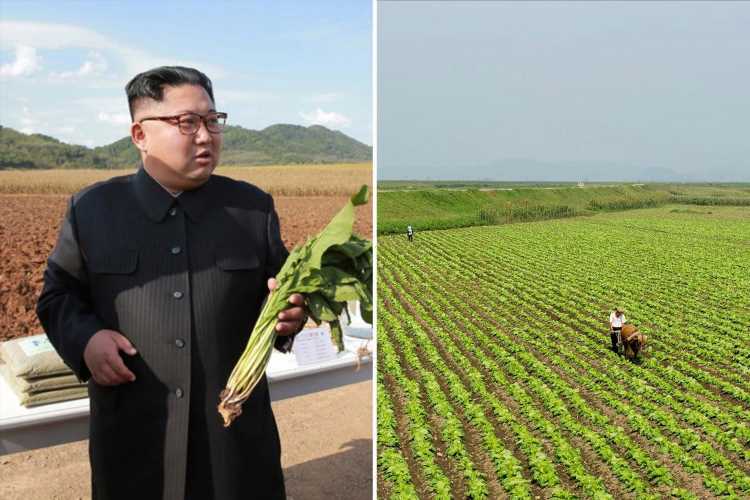NORTH Korea will run out of food in just two months, amid fears Kim Jong Un faces a repeat of the famine that killed millions.
The price of staple foods have skyrocketed as a result of intense storm damage to the state’s produce industry, with items like coffee reportedly being sold for up to $US100 for a packet.
According to reports from News.com.au, Kim Jong Un on Tuesday addressed a growing crisis in his country’s agricultural sector.
Kim reportedly admitted the situation was “getting tense”, admitting that the state-run economy cannot feed its citizens.
While the price of essentials like rice and fuel have reportedly held firm, CNN has reported citizens in the state’s capital Pyongyang paying triple the regular price for potatoes, and $US70 for some teabags.
The dim outlook was expressed during a plenary session of the ruling Workers’ Party’s Central Committee on Tuesday, and originally reported by the isolated country’s official KCNA media arm.
The North Korean dictator also spoke about the rationing on the same week he appeared to have trimmed down from his hefty 22 stone.
He underwent a major cardiovascular procedure.
There are growing fears of a repeat of the devastating 1990s famine, which according to some estimates killed more than three million North Koreans.
Recent reports from the Food and Agriculture Organisation of the United Nations (FAO) said North Korea had just two months of supplies left.
The nation was said to be suffering a whopping 860,000 tonnes of supply shortages nationwide.
While Kim has refused to detail the extent of the food shortage crisis, he has recently warned citizens to be prepared for another “Arduous March,” the name given to the 1990s food crisis.
“I made up my mind to ask the WPK (Workers’ Party of Korea) organisations at all levels, including its Central Committee and the cell secretaries of the entire party, to wage another more difficult ‘arduous march’ in order to relieve our people of the difficulty, even a little,” Kim said in April.
International trade sanctions have long plagued the pariah state, but the devastating impact of both Covid-19 combined with restrictions on importing goods has brought the grim situation to a head, according to Chinese Foreign Ministry spokesman Zhao Lijian.
The other cause for the food fears is due to the Covid-19 pandemic.
North Korea sealed its borders to contain the spread of the disease, but commerce with China suffered.
North Korea is heavily dependent on China for not only food but also its fertilizer and fuel.
The North Korean leader said he has left the door open for talks with US President Joe Biden.
However, he has admitted he is prepared for “both dialogue and confrontation” over the topic of nuclear arms. Kim has long remained adamant against resuming arms talks with the US, which could offer relief from sanctions choking the North Korean economy.
Despite the bleak economic situation, Kim has reportedly continued to escalate his nuclear arsenal, which North Korea says is to prevent an invasion from America.
And as the food crisis escalates, North Korea has stepped up repression of its own citizens.
A renewed crackdown on the importation of foreign cultural influences such as K-pop has been launched, with Kim describing the aforementioned South Korean import as a “vicious cancer” plaguing North Korea’s youth.
The dictator believes the genre of music is corrupting the minds of the next generation, influencing their “attire, hairstyles, speeches and behaviours”.
The new legislation could see offenders, including high school students, serve anywhere between five and 15 years of hard labour if they are caught watching prohibited content such as South Korean dramas.
Global internet is banned by default in North Korea, with official government broadcasts the only media made available on local TV and radio. The authoritarian nation also employs disciplinary officers to roam the streets and correct men with long hair and women with revealing or tight clothing.
Kim has publicly feared for the “ideological and mental state” of the next generation, warning that the unchecked distribution of foreign culture could see the socialist country “crumble like a damp wall”.
“Young North Koreans think they owe nothing to Kim Jong-un,” North Korean defector Jung Gwang-il told The New York Times.
“He must reassert his ideological control on the young if he doesn’t want to lose the foundation for the future of his family’s dynastic rule.”
Source: Read Full Article










